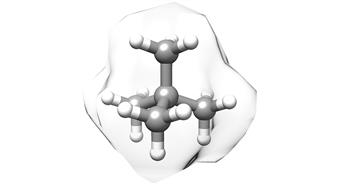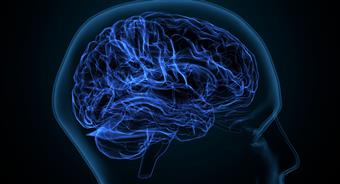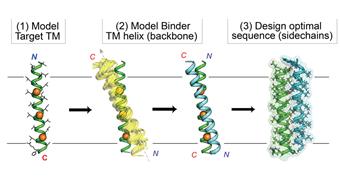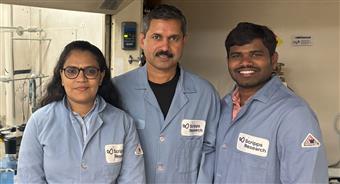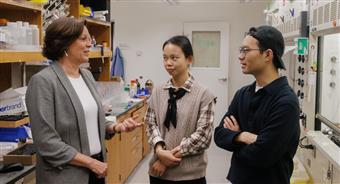
How sensory neurons impact the gut Scripps Research scientists show that the receptor PIEZO2 in sensory neurons controls gut motility and transit time, which are important for digestion and nutrient absorption.
August 03, 2023
LA JOLLA, CA Gastrointestinal and digestive issues impact roughly 3 million people across the United States alone, and that number is growing. A new study from Scripps Research scientists shows how sensory neurons control our gastrointestinal tracts critical information that could shape our understanding of related diseases and disorders.
The study, published in the journal Cell on Aug. 3rd, 2023, used a combination of human clinical data and animal models to reveal that the receptor PIEZO2 controls gastrointestinal transit through the stomach, small intestine, and colon by sensing the presence of food and slowing the rate of gut motility accordingly. These findings could lead to therapeutic applications for a range of gastrointestinal conditions, such as Inflammatory Bowel Disease and Irritable Bowel Syndrome.
PIEZO2 plays a crucial role in gastrointestinal physiology and is necessary for normal gut function, says senior author Ardem Patapoutian, PhD, professor in the Dorris Neuroscience Center at Scripps Research and a Howard Hughes Medical Institute investigator. Patapoutian received the 2021 Nobel Prize in Physiology for discovering that PIEZO2 and a related receptor, PIEZO1, are necessary for the cells to respond to mechanical stimuli. Food and other ingested contents activate PIEZO2, which in turn dramatically slows gut transit.
Gut transit time the rate at which food moves through our gastrointestinal tracts is essential for digestion, nutrient absorption and waste removal. Optimal digestion requires an optimal transit time: too slow, and you end up with constipation; too fast, and you risk diarrhea. Up until now, there's been a limited understanding of how sensory pathways guide this process.
Patapoutian's team decided to investigate whether sensory input from the receptor PIEZO2 plays a role in gut motility. PIEZO2 proteins are activated by mechanical forces or pressure and are found throughout the body, though their role in gastrointestinal motility has not been previously explored. PIEZO2 receptors are also involved in sensing the degree of lung inflation or bladder filling, so it made sense that these receptors might also be able to detect distension of the gastrointestinal tract.
We wanted to understand the consequences of lacking this mechano-sensation and whether people without PIEZO2 have gastrointestinal problems, says M. Rocio Servin-Vences, PhD, the study's first author and a postdoctoral fellow in the Patapoutian lab at Scripps Research and the Howard Hughes Medical Institute.
Humans are sometimes though rarely born without functional PIEZO2 genes, and studying these individuals provides a window into the protein's function. In collaboration with Alexander Chesler's team at the National Institutes of Health (NIH), the researchers assessed the gastrointestinal health and medical history of a cohort of 12 humans, ranging in age from 9 to 42, who carried non-functional variants of the PIEZO2 gene.
Compared to members of the general population, the PIEZO2-deficient individuals reported a range of gastrointestinal dysfunctions including lumpy and watery stools. Notably, six of the individuals reported that they could not sense bowel movements, and five reported using medications to relieve gastrointestinal distress.
The gastrointestinal dysfunction that these PIEZO2-deficient individuals described was striking, says Servin-Vences. It suggests that PIEZO2-deficient individuals have impaired sensation in bowel function that affects their quality of life, and also that the mechanosensitive channel PIEZO2 plays a crucial role in human gastrointestinal physiology and pathophysiology.
To explore the mechanism behind how PIEZO2 governs gut physiology, the researchers next turned to animal models. They found that when PIEZO2 was removed from sensory neurons, the mice had much faster gut transit times, more frequent defecation and their stools had a higher water content.
We were able to show that PIEZO2 is important for slowing down gastrointestinal transit, says Servin-Vences. When mice do not have PIEZO2 in these neurons, their gastrointestinal transit goes super fast, which has important consequences because it suggests that there is not enough time for proper nutrient absorption.
Since PIEZO2 is expressed by multiple groups of neurons that innervate the gut, the researchers also wanted to pinpoint which neural pathway is responsible for controlling gut transit time. By using genetic and viral tools to selectively shut down PIEZO2 in two neural pathways the nodose ganglia and dorsal root ganglia the researchers were able to show that neurons in the dorsal root ganglia are exclusively responsible for controlling gut motility.
It was very surprising that neurons from the dorsal root ganglia but not from the nodose ganglia have a homeostatic function in gut motility, says Servin-Vences. The nodose ganglia is known to regulate many functions in the gut, lungs and heart, whereas neurons from the dorsal root ganglia are more known for innervating the skin and detecting temperature and pain.
The team also used fluorescent imaging to show that PIEZO2 control of gut motility occurs along the entire gastrointestinal tract from stomach to small intestine to colon.
Though this is just an initial glimpse into how sensory neurons control gut motility, the researchers say it opens a slew of new research questions, and the possibility for future therapeutics. Servin-Vences says next steps are to assess how diet, lifestyle, stress and even microbiota affect this complicated system.
In the long term, if we are able to
More from Scripps
20/04/2024
New copper-catalyzed C-H activation strategy from Scripps Research Two-mode reactions inspired by human detox enzymes offer powerful new tools for drug discover...
12/04/2024
Scripps Research chemists devise easier new method for making a common type of building block for drugs Scientists transform simple linear amines into saturated...
06/04/2024
A simple, inexpensive way to make carbon atoms bind together A Scripps Research team uncovers a cost-effective method for producing quaternary carbon molecules,...
04/04/2024
Developing a vaccine for the zombie drug xylazine Scripps Research chemical biologists design an early proof-of-concept vaccine that could lead to the first...
30/03/2024
How blocking a neural receptor responsible for addiction could reduce alcohol use A Scripps Research team found that a new therapeutic that targets the kappa op...
13/03/2024
New computational strategy boosts the ability of drug designers to target proteins inside the membrane Customized-design approach could streamline the design of...
29/02/2024
Scripps Research scientists reveal how first cells could have formed on Earth New phospholipid discovery brings researchers closer to understanding how primordi...
29/02/2024
How molecular handedness emerged in early biology Scripps Research chemists fill a major gap in origin-of-life theories.
February 28, 2024
LA JOLLA, CA Mole...
22/02/2024
Snaking toward a universal antivenom Scripps Research scientists discovered antibodies that protect against a host of lethal snake venoms.
February 21, 2024
...
06/02/2024
Calibr-Skaggs announces expansion of option and license agreement with AbbVie to develop novel cell therapies for solid tumors and autoimmune diseases
AbbVie...
26/01/2024
Re-energizing mitochondria to treat Alzheimer's disease Scripps Research team restored neuron-to-neuron connections in human cells.
January 25, 2024
LA JO...
24/01/2024
100 years of Science Changing Life: Scripps Research celebrates a century of transforming human health For the last century, institute leaders and renowned scie...
23/01/2024
New technology lets researchers track brain cells' off switches The method could shed light on what goes awry in numerous brain conditions when neurons ar...
09/01/2024
Three decades of giving: Announcing the Calibr-Skaggs Institute for Innovative Medicines The ALSAM Foundation, founded by the Skaggs family, provides lasting g...
04/01/2024
Life science entrepreneur Gene Lay joins Scripps Research Board of Directors Lay, founder of the global biotech company BioLegend, brings invaluable experience ...
21/12/2023
Taming a plant-derived toxin Scripps Research team modifies the traditional poison picrotoxinin for potential neurological drugs and anti-parasite treatments. ...
19/12/2023
Scripps Research Executive Vice President Eric Topol gives TED talk on transformative power of AI in medicine Topol provides an overview of how AI models can i...
13/12/2023
New AI-powered algorithm could better assess people's risk of common heart condition Early detection of atrial fibrillation can reduce the risk of stroke an...
07/12/2023
Nanoparticle flu vaccine design shows promise in early tests Scripps Research-designed vaccine could provide broad, enduring protection against influenza A str...
16/11/2023
Numerous Scripps Research scientists named Highly Cited Researchers Clarivate's annual, global list represents researchers who have demonstrated significant...
07/11/2023
Multiple sclerosis drug invented at Scripps Research slows long-term devastating disease progression Late-breaking data reinforces the effectiveness and safety ...
05/10/2023
Keren Lasker named a 2023 Moore Inventor Fellow The prestigious award will support Lasker's inventive research in membraneless organelles and their applica...
22/09/2023
Michael Bollong named a 2023 Amgen Young Investigator The prestigious award will support Bollong's research identifying new molecular targets and therapeuti...
09/09/2023
Philip Dawson receives 2024 American Chemical Society National Award Dawson is honored with the Arthur C. Cope Late Careers Scholar Award for his foundational c...
07/09/2023
Scripps Research chemists devise a method for C-H activation of alcohols The method represents a new toolkit for making drugs and other compounds.
September 06...
31/08/2023
Scripps Research receives $1.5M to surveil infectious disease threats in wastewater Bill & Melinda Gates Foundation award to support the development of multi-pa...
16/08/2023
How cold temperatures trigger the brain to boost appetite Scripps Research scientists' discovery could lead to new weight loss and metabolic health treatmen...
08/08/2023
Human antibody that targets carfentanil, fentanyl and related opioids reverses overdose effects in preclinical study Scripps Research-developed antibody therapy...
04/08/2023
How sensory neurons impact the gut Scripps Research scientists show that the receptor PIEZO2 in sensory neurons controls gut motility and transit time, which a...
26/07/2023
AbbVie and Calibr Expand Strategic Collaboration to Advance Several Preclinical and Early-stage Clinical Assets The expanded strategic collaboration will advan...
23/07/2023
Scripps Research scientists develop AI-based tracking and early-warning system for viral pandemics Machine-learning system effectively predicts emergence of pro...
19/07/2023
Monitoring T cells may allow prevention of type 1 diabetes Scripps Research study shows that analyzing T cells in blood samples could be used to select at-risk ...
19/07/2023
Scripps Research mourns passing of leading organic chemist Albert Eschenmoser Eschenmoser pioneered key reactions in synthetic chemistry and shaped the understa...
15/06/2023
Scripps Research awarded $46.8 million by NIH to promote human health through innovative translational science and training The Translational Institute is harne...
13/06/2023
Scripps Research's Danielle Grotjahn named 2023 Pew Scholar in the Biomedical Sciences The award will support Grotjahn's study of how cells assemble the...
31/05/2023
Crossing the ring: new method enables C-H activation across saturated carbocycles Scripps Research chemists add another powerful tool to their molecular editin...
24/05/2023
Scripps Research develops behind-the-scenes tool for better biomedical data discovery The new resource makes datasets more discoverable for life science communi...
19/05/2023
Scripps Research neuroscientist Hollis Cline elected to American Academy of Arts and Sciences Cline is recognized for her discoveries about the role of sensory ...
19/05/2023
Scripps Research's Skaggs Graduate School awards doctoral degrees to 31st graduating class Commencement ceremony will be livestreamed via Zoom and on instit...
13/05/2023
A better route to benzocyclobutenes, sought-after building blocks for drugs Scripps Research chemists devise a new, C-H activation-based method for the synthesi...
09/05/2023
Renowned Scripps Research professor Jeffery Kelly elected to National Academy of Sciences Kelly's groundbreaking work on protein misfolding has led to thera...
28/04/2023
Mirror-image molecules pave new path for cancer drug discovery By comparing how mirror image versions of small molecules impact clusters of proteins, Scripps R...
22/04/2023
How alcohol consumption contributes to chronic pain A Scripps Research team showed how both alcohol intake and alcohol withdrawal can lead to increased pain and...
21/04/2023
Xin Jin receives dual awards to study autism risk genes in neurodevelopment Major grants from the National Institutes of Health and California Institute for Reg...
20/04/2023
Trim the sugar: New HIV vaccine design improves immune response Scripps Research vaccine candidate headed for clinical trials.
April 19, 2023
LA JOLLA, CA A...
18/04/2023
Therapeutic can seek and destroy potent opioid to treat overdoses Scripps Research chemists developed a new biologic to work against the synthetic opioid carfen...
07/03/2023
How heavy alcohol consumption increases brain inflammation The findings by a Scripps Research team point toward a potential new drug target for treating alcohol...
02/03/2023
Scientists find human antibodies that can block multiple coronaviruses including SARS-CoV-2 Results from a Scripps Research and UNC team pave the way for a vacc...
28/02/2023
$10 million grant funds Scripps Research Alcohol Research Center through its 50th year The five-year grant supports research into the neurobiology of alcohol us...
28/02/2023
Immune system drug shows promise in treating alcohol use disorder, a Scripps Research clinical trial reports Scientists at Scripps Research found that apremilas...
 How sensory neurons impact the gut Scripps Research scientists show that the receptor PIEZO2 in sensory neurons controls gut motility and transit time, which are important for digestion and nutrient absorption.
How sensory neurons impact the gut Scripps Research scientists show that the receptor PIEZO2 in sensory neurons controls gut motility and transit time, which are important for digestion and nutrient absorption.















